
This dialect presents phenomena that offer a real challenge to current linguistic theory. The Afro-Bolivian Spanish Determiner Phrase elaborates on the importance of enhancing a stronger dialogue between formal generative theory and sociolinguistic methodology, in line with recent work in the field of minimalist syntax. Sessarego’s study combines sociolinguistic techniques of data collection with generative models of data analysis to obtain more fine-grained, empirically testable generalizations.
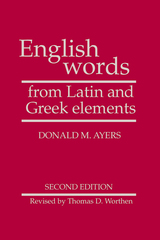
Why a whole book based on this approach? Ayers' text exposes students to a wider range of roots, introduces new English words in context sentences, and reinforces vocabulary through exercises. It promotes more practice with roots so that students learn to use them as tools in their everyday encounters with new words. English Words is written from the standpoint of English; it neither attempts to teach students Latin or Greek nor expects a knowledge of classical languages on the part of instructors. Its success has been demonstrated at both the secondary and college levels, and it can be used effectively with students in remedial or accelerated programs.
An Instructor's Manual (gratis with adoption) and a Workbook are also available.
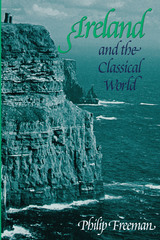
On the boundary of what the ancient Greeks and Romans considered the habitable world, Ireland was a land of myth and mystery in classical times. Classical authors frequently portrayed its people as savages—even as cannibals and devotees of incest—and evinced occasional uncertainty as to the island's shape, size, and actual location. Unlike neighboring Britain, Ireland never knew Roman occupation, yet literary and archaeological evidence prove that Iuverna was more than simply terra incognita in classical antiquity.
In this book, Philip Freeman explores the relations between ancient Ireland and the classical world through a comprehensive survey of all Greek and Latin literary sources that mention Ireland. He analyzes passages (given in both the original language and English) from over thirty authors, including Julius Caesar, Strabo, Tacitus, Ptolemy, and St. Jerome. To amplify the literary sources, he also briefly reviews the archaeological and linguistic evidence for contact between Ireland and the Mediterranean world.
Freeman's analysis of all these sources reveals that Ireland was known to the Greeks and Romans for hundreds of years and that Mediterranean goods and even travelers found their way to Ireland, while the Irish at least occasionally visited, traded, and raided in Roman lands. Everyone interested in ancient Irish history or Classics, whether scholar or enthusiast, will learn much from this pioneering book.
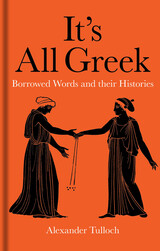
This book offers a word-by-word look at the influence of Greek on everyday words in English, telling the stories behind the etymological developments of each example and tracing their routes into modern English via Latin and European languages. It also explains connections with ancient Greek culture, in particular mythology, politics, and warfare, and includes proverbs and quotations from Greek literature. Revealing how deeply indebted we are to the language spoken in Athens 2,500 years ago, this book is the perfect gift for any logophile.
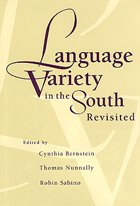
Top linguists from diverse fields address language varieties in the South.
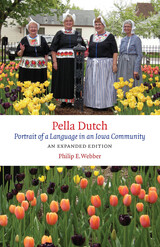
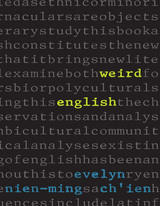
With increasing frequency, readers of literature are encountering barely intelligible, sometimes unrecognizable languages created by combining one or more languages with English. Evelyn Ch'ien argues that weird English constitutes the new language of literature, implicitly launching a new literary theory.
Weird English explores experimental and unorthodox uses of English by multilingual writers traveling from the canonical works of Nabokov and Hong Kingston to the less critiqued linguistic terrain of Junot Díaz and Arundhati Roy. It examines the syntactic and grammatical innovations of these authors, who use English to convey their ambivalence toward or enthusiasm for English or their political motivations for altering its rules. Ch'ien looks at how the collision of other languages with English invigorated and propelled the evolution of language in the twentieth century and beyond.
Ch'ien defines the allure and tactical features of a new writerly genre, even as she herself writes with a sassiness and verve that communicates her ideas with great panache.
READERS
Browse our collection.
PUBLISHERS
See BiblioVault's publisher services.
STUDENT SERVICES
Files for college accessibility offices.
UChicago Accessibility Resources
home | accessibility | search | about | contact us
BiblioVault ® 2001 - 2024
The University of Chicago Press









